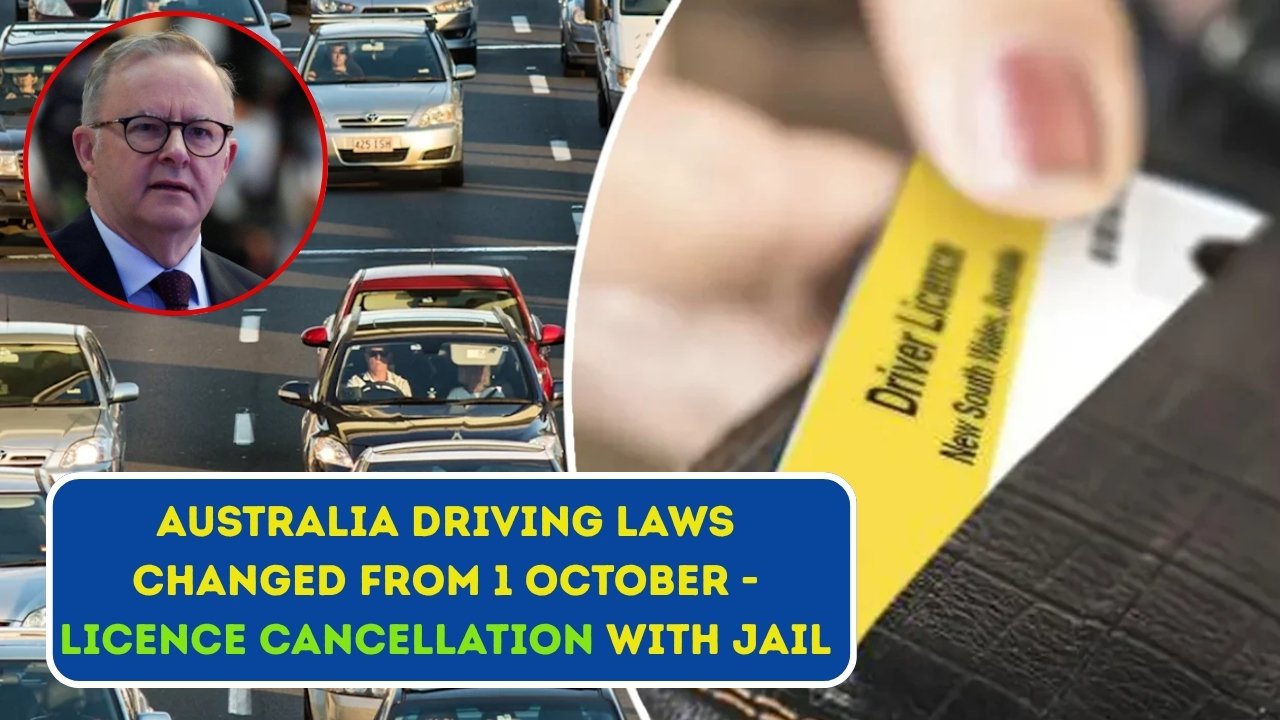Driving in Australia has always come with a set of rules and responsibilities. But from 1 October 2025, the driving laws have undergone a serious shake-up. If you’ve been keeping an eye on road safety announcements, you probably know that governments across different states have been pushing harder to reduce dangerous driving. And now, the stakes are much higher. The latest reforms bring tougher penalties, including instant licence cancellation and even jail time for certain offences.
This isn’t just another round of “slap-on-the-wrist” fines. No, this time, lawmakers mean business. So, whether you’re someone who drives every day to work or just an occasional weekend road-tripper, these changes affect you directly. Let’s break it down in plain language, with a bit of context and clarity.
What Exactly Changed on 1 October?
As of 1 October, the rules across multiple Australian states now carry zero tolerance for high-risk driving behaviour. Some of the biggest changes include:
- Immediate Licence Cancellation – Drivers caught committing serious offences like extreme speeding, dangerous driving, or repeat drink-driving can have their licences cancelled on the spot. No warnings. No drawn-out processes.
- Jail Time for Repeat Offenders – It’s not just about fines anymore. If you’re caught driving recklessly or under the influence multiple times, you could face jail sentences ranging from weeks to several months.
- Expanded Definition of Dangerous Driving – It’s not limited to drink or drug driving anymore. Tailgating aggressively, street racing, using mobile phones in high-risk ways, and extreme speeding now fall under this category.
- Harsher Minimum Penalties – Instead of leaving it entirely to the court’s discretion, new minimum penalties have been set. That means even first-time offenders in certain categories won’t just get a small fine; they’ll face significant consequences.
Why These Harsh Laws Now?
Honestly, road accidents remain one of the leading causes of preventable deaths in Australia. To be fair, most drivers do follow the rules, but there’s a minority who put everyone else at risk. Policymakers argue that past penalties weren’t tough enough to deter reckless behaviour.
On the flip side, critics say the new laws might feel heavy-handed and could unfairly punish people who made a one-time mistake. But authorities insist that the statistics don’t lie: distracted driving, speeding, and intoxication have been the root cause of far too many tragedies. The hope is that tougher consequences will push drivers to think twice before making dangerous decisions.
Real-Life Examples – How It Plays Out
Let’s paint a picture. Imagine you’re caught doing 45 km/h over the speed limit in a suburban area. Under the new law, you could lose your licence immediately. Not suspended—cancelled. You’ll have to go through the process of reapplying for a licence later, which includes tests and checks.
Or take another example: someone repeatedly caught drink-driving with high blood alcohol content. Before, they might have only lost their licence for a while. Now, they could face jail time, with courts having little room to let them off lightly.
What This Means for Everyday Drivers
For most responsible drivers, these changes may not feel like a direct threat. But the ripple effect is real. Police now have broader powers, which means roadside checks could become more common. Insurance premiums might also be influenced, especially for high-risk categories.
It also means drivers have to be extra cautious not to slip up—even unintentionally. Something as “small” as holding your phone for a second in traffic could now be classed as dangerous if it creates a high-risk situation.
Support and Backlash
Like any major reform, reactions have been mixed. Road safety advocates are cheering, saying these changes could save hundreds of lives. Families who’ve lost loved ones in crashes often argue that leniency in the past has cost too much.
On the other hand, civil rights groups and some legal experts are warning about potential overreach. They worry that giving police the power to instantly cancel licences could lead to disputes or misuse in certain scenarios.
The Bigger Picture
At the end of the day, the law changes highlight a simple truth: driving is not a right, it’s a privilege. And with that privilege comes responsibility. The government’s message is clear—if you’re going to get behind the wheel, you must take it seriously.
So, as we settle into this new phase of driving rules, the best advice is simple: stay alert, stay sober, and stay safe. Because now, the consequences of breaking the rules aren’t just financial—they can alter your entire future.
New Penalties from 1 October 2025
| Offence | Old Penalty (Typical) | New Penalty (From 1 Oct 2025) |
|---|---|---|
| Extreme speeding (40km/h+) | Fine + demerit points | Immediate licence cancellation |
| Repeat drink-driving | Licence suspension + fine | Licence cancellation + Jail |
| Street racing / hooning | Fine + possible suspension | Licence cancellation + Jail |
| High-risk phone use while driving | Fine + demerit points | Dangerous driving charge |
| Aggressive tailgating | Warning/fine | Dangerous driving charge |
FAQs
Q1: Do these laws apply nationwide in Australia?
Not exactly. Most states are adopting similar changes, but details can vary. Always check your local road authority’s website.
Q2: Can first-time offenders face jail under the new rules?
Yes, but mainly in extreme cases like very high-speed driving or drink-driving with serious risk.
Q3: What happens after licence cancellation?
You’ll need to reapply for a licence, sometimes from scratch, which can involve tests, fees, and strict conditions.
Q4: Are police decisions final when cancelling licences?
They have the power to cancel instantly, but you may appeal through legal channels.
Q5: Does this affect international drivers in Australia?
Yes, international licence holders can be banned from driving in Australia if caught under these offences.
